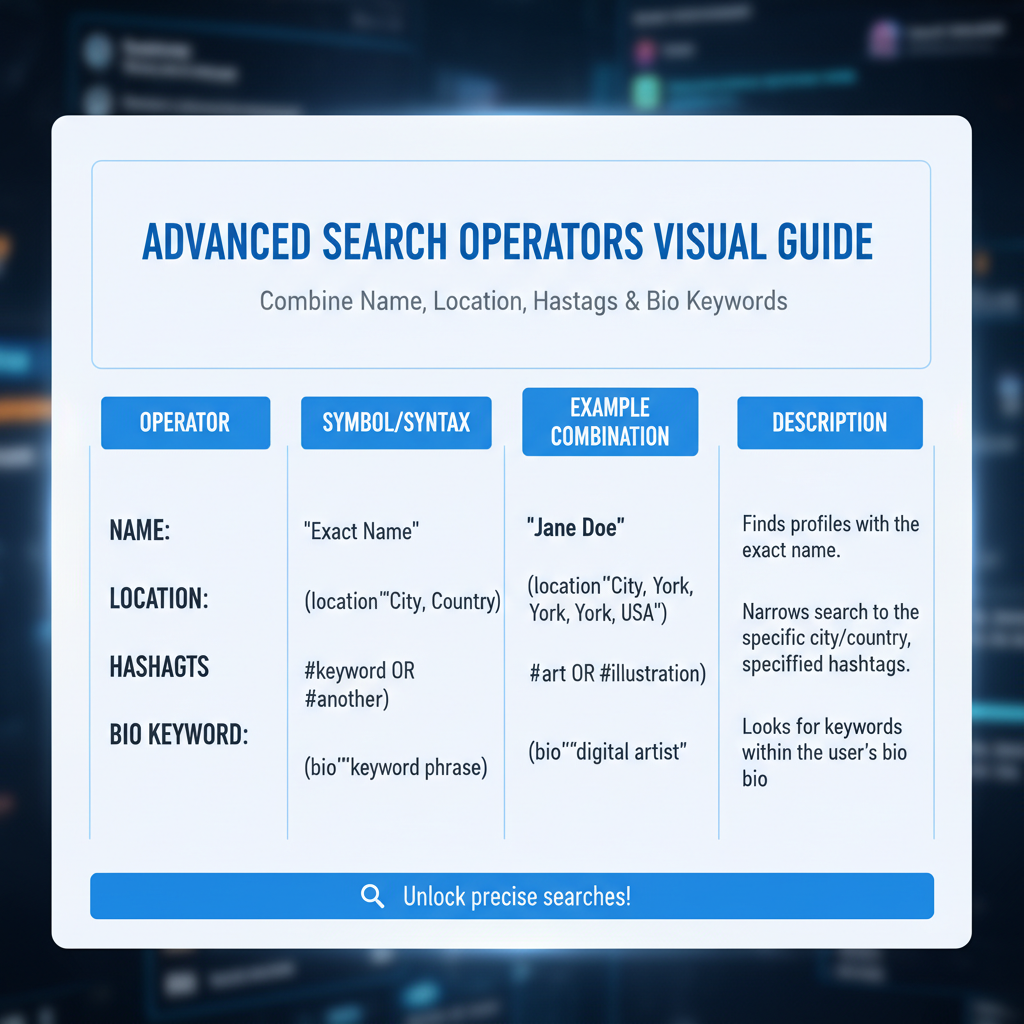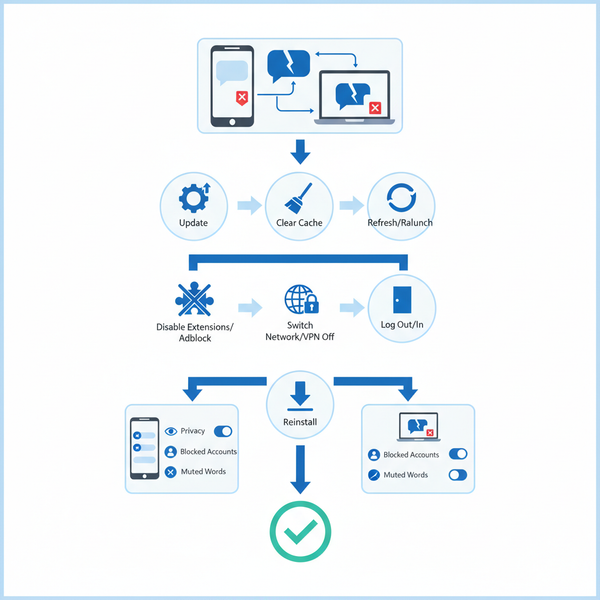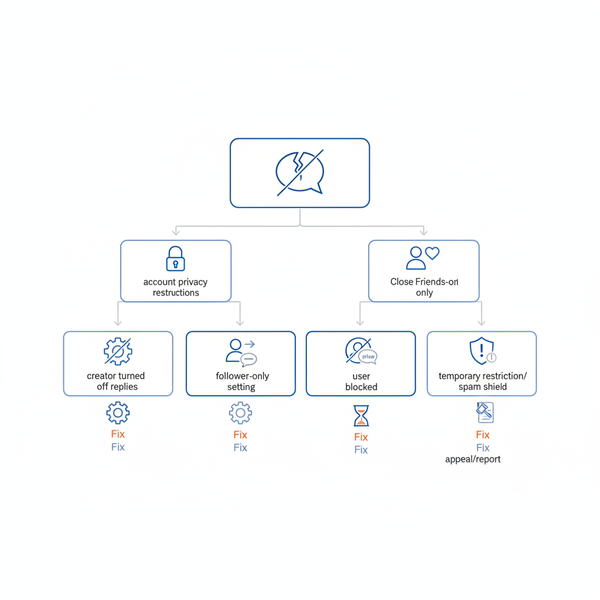Search for Someone on Twitter Using Advanced Filters
Learn to find the right person on Twitter using advanced filters, search operators, hashtags, and profile details for precise account discovery.

Search for Someone on Twitter Using Advanced Filters
Searching for someone on Twitter can be straightforward—but to find exactly the right person, applying advanced Twitter search filters makes all the difference. Rather than relying on random matches in the feed, combining Twitter’s built-in search tools with special operators, hashtags, and external search methods helps you quickly connect with the right accounts. This guide walks through practical steps, from easy username lookups to layered advanced queries.

---
Understanding Twitter’s Search Bar and Filters
Twitter’s search bar sits at the top of both desktop and mobile interfaces. By default, entering a keyword or name yields a mix of tweets, profiles, and media content.
Built-in filters include:
- Top — Tweets considered most relevant
- Latest — Tweets sorted chronologically
- People — Accounts matching your query
- Photos and Videos — Tweets containing specific media
- News — Tweets linked to news content
Switching between these filters ensures more targeted results, especially when your goal is account discovery rather than general topic browsing.
---
Use Exact Usernames and @Handles for Direct Searches
If you know a Twitter handle precisely, you can search for it directly. Twitter recognizes exact matches instantly.
Example:
@elonmuskHandles are alphanumeric and may include underscores but never spaces.
Partial handle searches can work, but exact handles yield the fastest and most accurate matches.
---
Leverage Advanced Search Operators
Twitter’s advanced operators offer precision beyond basic filtering. Popular ones include:
from:username
to:username
"exact phrase"
min_retweets:10
min_faves:50- from: — Tweets sent by an account
- to: — Tweets addressed to an account
- `"exact phrase"` — Matches exact wording
- min_retweets / min_faves — Finds tweets above an engagement threshold
You can combine operators for more targeted results:
from:exampleuser "project update" since:2023-01-01
---
Search by Name Plus Location or Profession Keywords
When partial information is all you have, pair the name with another defining keyword such as city or profession:
John Smith Boston
Jane Doe "data scientist"This method leverages:
- Location mentions in bios
- Profession keywords that distinguish people with common names
---
Use Hashtags and Trending Topics to Find Active Users
Hashtags group related tweets, making it easy to locate people engaged in particular topics.
Examples:
#MachineLearning
#BostonTechWhy this works:
- Active hashtag contributors often welcome public engagement
- Influencers emerge by analyzing top posts within these hashtags
---
Explore “People” Tab vs “Latest” Tab
When searching:
- People tab — Filters results to accounts matching your query by display name, handle, or bio
- Latest tab — Presents recent tweets mentioning your search terms, indirectly leading you to the person
Switch deliberately between these tabs depending on whether your goal is to locate a profile or discover related content.
---
Refine Results by Following/Followers Count and Bio Keywords
Once profiles are identified, evaluate additional details:
| Filter | Why It Helps |
|---|---|
| Follower Count | Indicates reach and likely authenticity |
| Following Count | Shows level of network engagement |
| Bio Keywords | Reveal location, profession, or shared interests |
These clues help confirm the relevance and credibility of accounts.
---
Check Mutual Connections to Confirm Identity
Look for:
- Users followed by mutual acquaintances
- “Followed by” indicators beneath names
Seeing friends or colleagues in common adds confidence that you have located the correct person.
---
Use Third-Party Tools and Search Engines
Some accounts are easier to find using external searches:
- Social profile aggregators such as Pipl or Spokeo
- Search engines with site-specific queries:
- Google’s `site:` operator limits results to Twitter pages, often revealing profiles not surfaced through Twitter’s native search.
site:twitter.com "John Smith" "Boston"
---
Privacy and Ethical Guidelines
Follow best practices when searching for someone:
- Never harass or violate Twitter’s terms of service
- Avoid sharing private information without consent
- Respect protected accounts and understand access limits
Your aim should always be positive, professional, and respectful engagement.
---
Summary and Next Steps
Finding someone on Twitter is easier if you:
- Start with exact usernames when possible
- Use advanced search operators for targeted results
- Combine names with distinctive keywords
- Explore hashtags and relevant trending topics
- Switch strategically between People and Latest tabs
- Assess accounts by followers, bio content, and mutual connections
- Leverage external tools when needed
By following these steps, you can effectively search for someone on Twitter and improve your success in connecting with the right profiles. Ready to apply these techniques? Open Twitter’s search bar now and put these strategies into action.




